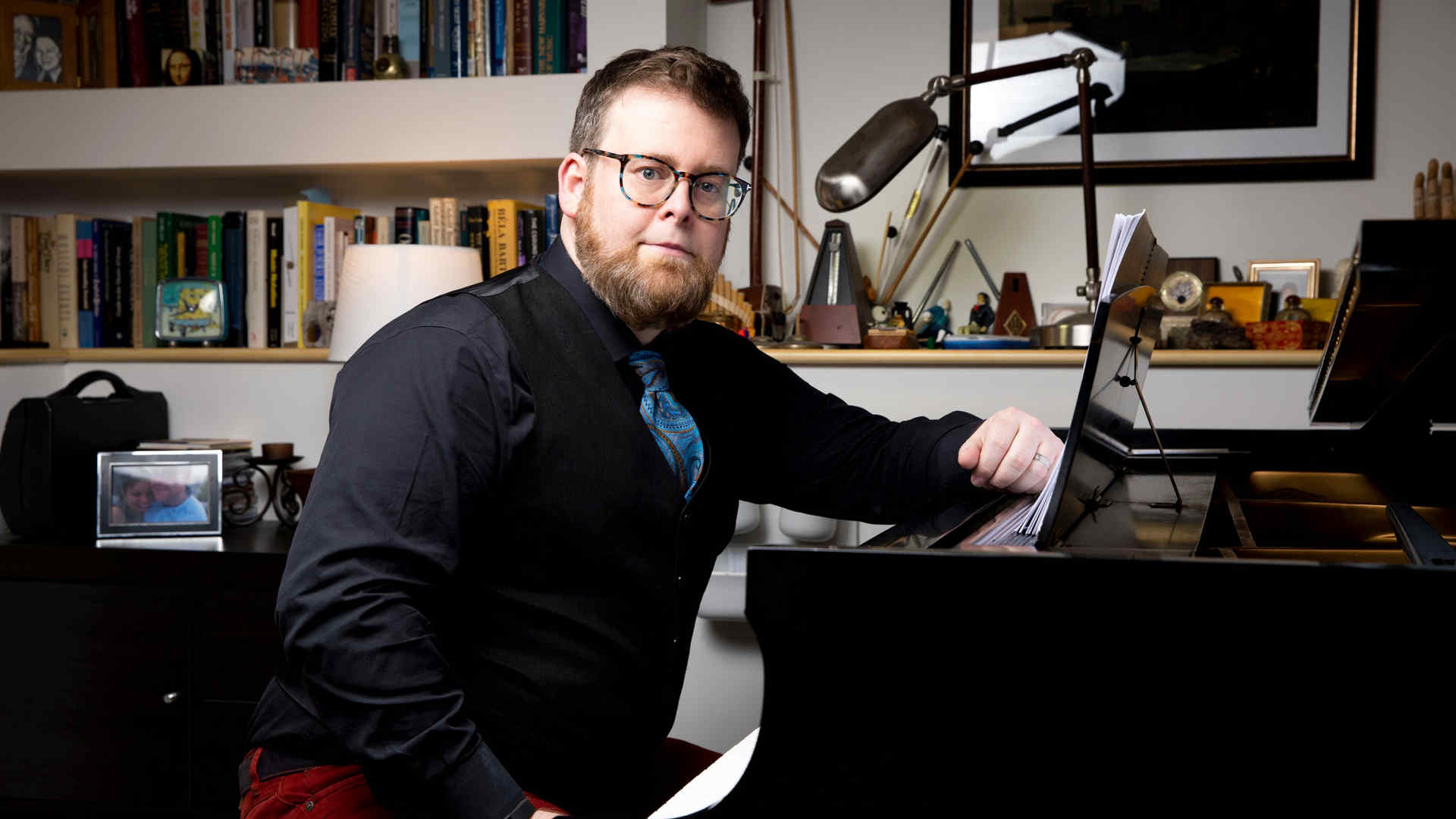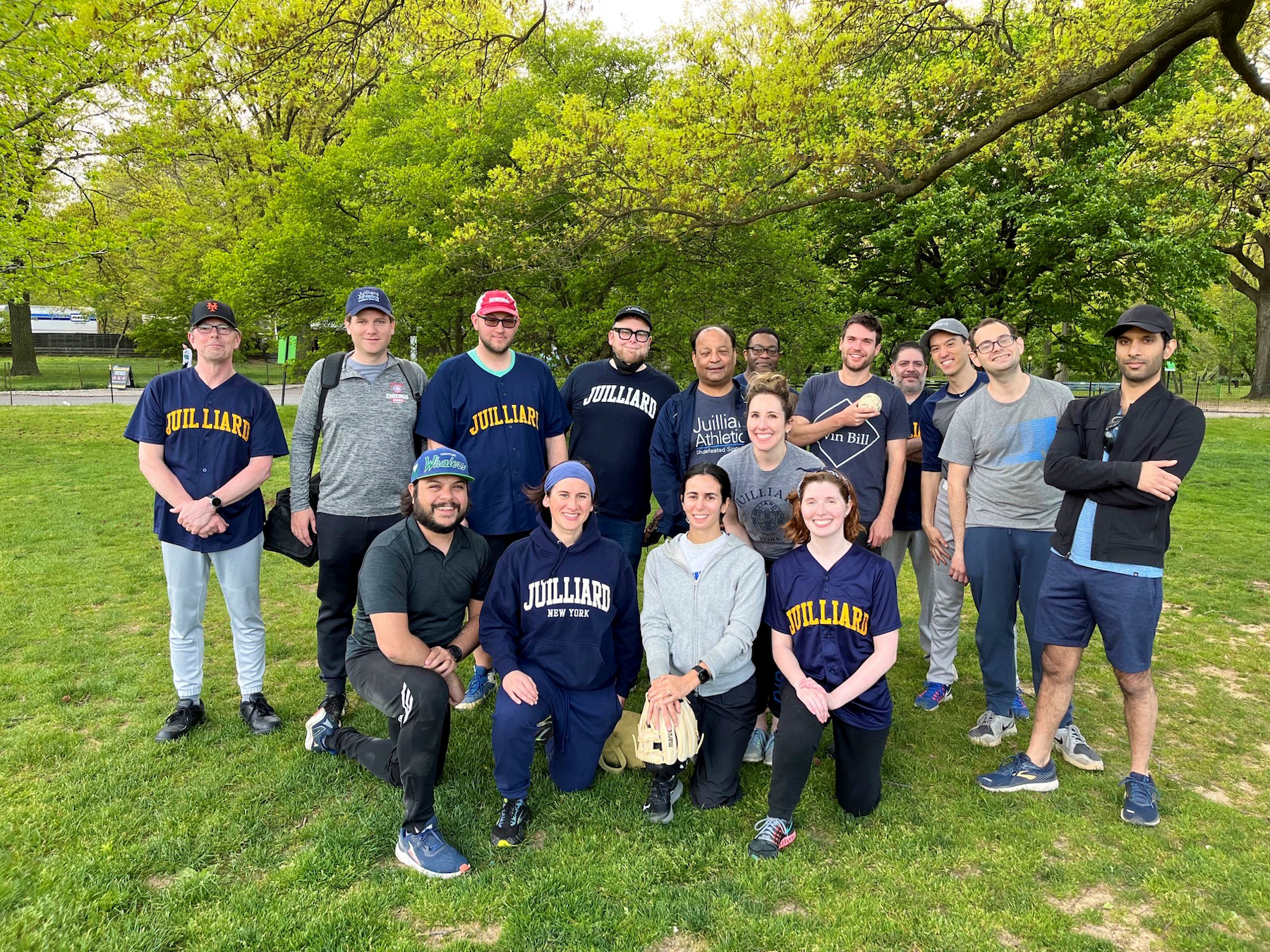
This summer, David Serkin Ludwig (Graduate Diploma ’02, composition), the dean and director of the Music Division, spoke with Journal editor Susan Jackson about what to expect this year. You can find more details about these performances at juilliard.edu/calendar.
What’s the big picture version of what’s happening in the Music Division?
I’m truly excited about all the incredible things happening in the Music Division right now! We are continually working to educate students to take on the challenges of building a 21st-century career and to find a wide variety of opportunities to share their artistry with the world.
When thinking about what guides us in the big picture, I keep coming back to how the core values of the school—Excellence, Creative Enterprise, and EDIB (Equity, Diversity, Inclusion, and Belonging)—are preconditions for each other. So much of what we’re doing draws from these core values and is about making sure that everyone at the school—students, alumni, and employees—knows they belong to the community and can contribute to it.
What are some of the other themes of the division?
The Music Division is always looking to work across disciplines with the dance and drama divisions and to find ways for our students to regularly pursue collaboration in their artistic practice. We also seek out opportunities with the preparatory and extension divisions as well as with venues, institutions, and community organizations around the city. And of course technology is key for Juilliard, as a leading school of performing arts, to reach a worldwide audience of learners and music lovers.
It should come as no surprise that as a composer, I’m looking to center creative work in the conservatory. One of my immediate goals is to further our commissioning program by facilitating the creation of new works from a range of composers from the Juilliard community. Several departments already actively commission, and I’d like to see this across the conservatory. I’m excited about working with colleagues on faculty and staff to design programs and curricula that support new music.
You’ve talked about, moving forward, creating a new contemporary music series—what will that look like this year?
I’ll be co-curating a new series with guest conductors, composers, instrumentalists, and artists from a variety of media to create compelling programs of contemporary music for our students to perform for live audiences, which will also be streamed to the world. There are already a number of exciting performances planned for this year. One is a double bill of Stravinsky’s L’histoire du soldat and A Fiddler’s Tale by Wynton Marsalis (’81, trumpet; director of Jazz Studies) conducted by David Robertson on January 19, which will also include dance and drama students.
Then in the spring, we’re doing a concert showcasing the music of Reena Esmail (BM ’05, composition), a composer who works between the worlds of Indian and Western classical music. It will be great to have her back at Juilliard! We’ll also have a performance of Terry Riley’s In C (1964), which many consider to be the first mainstream minimalist piece. It will be performed together in real time for audiences with students at both our New York and Tianjin Juilliard campuses. I think it’s going to be wild to have a synchronized concert seven thousand miles apart, and it’s the first time Tianjin and New York will be literally performing together. I’m also looking forward to the culminating performance of the new Theatre Etude class taught by guest faculty member Amy Beth Kirsten at the end of the school year. Students in the course will incorporate theatrical elements and movement into the creation and performance of their music. AXIOM continues to offer fabulous concerts that feature music from the 20th century as well as new works from the past 20 years. Jeff Milarsky (BM ’88, MM ’90, percussion) has done an amazing job programming this season, and it’s been great working together.
And of course we’ll continue to have concerts throughout the year featuring student compositions. I’m excited about all of these projects, and they all point to the future of our contemporary music programming.
Are there any curricular changes afoot immediately and in the long term?
Bach, Beethoven, Brahms, Boulanger—this is repertoire through which musicians develop technique and artistry, and it remains firmly at the center of Juilliard’s musical training. Institutionally we are exploring music well beyond what we might have just a few decades ago as well as broadening our definition of repertoire itself. This includes a focus on performing works by underrepresented composers past and present with the same commitment we bring to the so-called “standard rep.”
I like the adage about playing old music like it’s new and new music like it’s old—so that we approach older pieces with a fresh perspective, even if it’s a piece that we’ve played and heard countless times. Conversely, we approach new works with the same attention we afford the music we’ve grown up rehearsing and performing. I want to bring that approach and energy to everything we do.
I’m also interested in finding ways that Juilliard can help music students apply their education practically when it comes to performing and creative work. Can our musicians meaningfully speak about music from the stage? Can they write about music cogently? Can they effectively record themselves in audio and video to share their work? Students will only benefit from learning how to best present music in different ways to different audiences. Developing this skill set—which every conservatory student should have—begins with a strong foundation in the musical academics of ear-training, history, theory, and analysis.
How we communicate and conduct ourselves with one another is also an important part of student professional training, and we continue to encourage collegiality, respect, and positive collaboration in our work together.

Can you talk about the legacy of new music at Juilliard?
I’d love to! There’s an incredible history of new music here, and it’s an honor for me to be a part of the impressive list of composers who have graduated from the school. I was fortunate to have John Corigliano (faculty 1991-present) as my teacher at Juilliard. His incredible encouragement and support have continued to motivate me over the years to encourage and support younger composers myself. Composers are the creative core of our musical life here: I think of William Schuman and his longtime leadership of the school, I think of Luciano Berio (faculty 1965-71) teaching here and running a new music ensemble, and of Joel Sachs (faculty 1970-2022) and his many contributions to contemporary music through the decades. And of course, there’s Wynton Marsalis, a performer and composer of international acclaim working across disciplines.
In addition to classical and jazz concert music endeavors, we’re also making more opportunities for students to learn about film composing, as well as writing for mixed media, electronics, and nontraditional instruments. That all these opportunities are available to Juilliard students speaks so well for the school as a place where composers can contribute to the art form with the help and advocacy of their performer colleagues.
When I was appointed to the position of dean and director, I appreciated the importance the school placed on bringing in a person with an active career as a musician. I bring my life task as a composer to my work at Juilliard in many ways, including prioritizing the creation and performance of new works.
So should “contemporary music” still be its own category?
In theory, one wants the special programming of contemporary music to become obsolete in the sense that playing new music should be part and parcel of everything we do, There have been countless initiatives in contemporary music at Juilliard well before I arrived and that continue across our departments. Brian Zeger’s (MM ’81, piano) direction of Vocal Arts has always included contemporary works—this year, we’re doing an opera by Missy Mazzoli. Historical Performance under Robert Mealy has actively commissioned new pieces for historical instruments, which is an area that has a tremendous future for composers. And Jazz Studies under Wynton Marsalis (’81, trumpet) and Aaron Flagg’s (BM ’92, MM ’93, trumpet) leadership has an extraordinary history of commissioning a range works.
So this is already in the groundwater at Juilliard, and I think we’re ready to take our work with living composers even further.
Students come to the school now with a new kind of openness and curiosity
How has the school changed since you were a student?
Returning in this new role has been a great honor. I went to Juilliard 20 years ago, and in some ways it hasn’t changed in terms of upholding high standards and the commitment to rigorous training. But in many other ways, it’s entirely—and necessarily—different from when I was a student because the world itself is so different. Students come to the school now with a new kind of openness and curiosity. Part of that reflects an evolution of how we think about the role of artists as citizens and how students can best navigate and address the profound challenges we all face.
For me, the opportunity to lead Music Division at Juilliard, one of the top music conservatories in the world, while also pursuing my work as a composer—it’s nothing short of a dream come true.
>>In January, David Ludwig will introduce the vision for his new contemporary music series and talk with David Robertson, director of conducting studies, in advance of the Juilliard Orchestra’s January 19 Stravinsky/Marsalis double bill. Members $1,250+ are invited. Learn more about becoming a member.